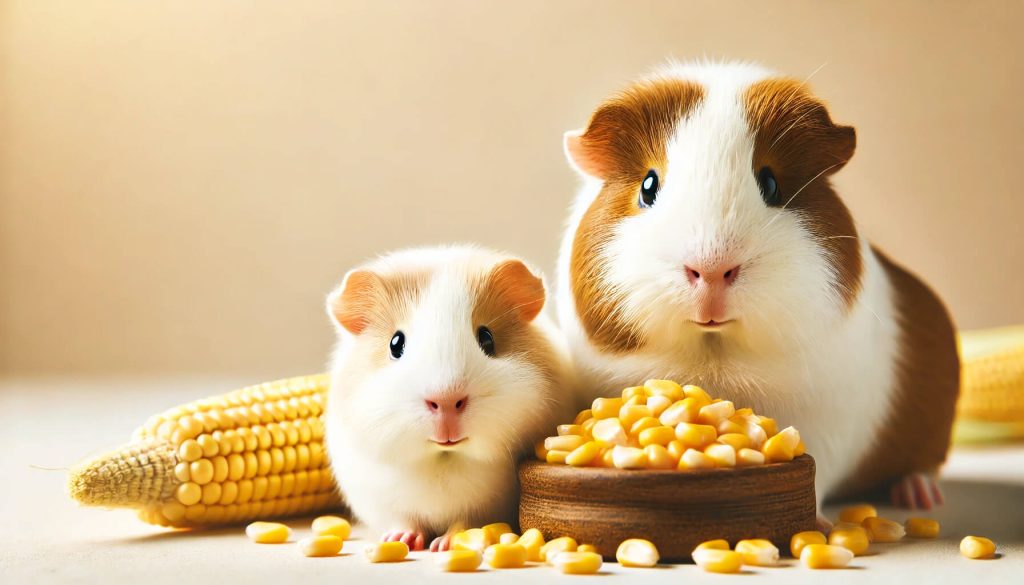
Can Guinea Pigs Eat Corn?
Understanding Guinea Pig Dietary Needs
To keep guinea pigs healthy, their diet requires careful attention. Understanding what they can eat ensures their well-being.
Essentials in a Guinea Pig’s Diet
A guinea pig’s diet must include specific nutrients to avoid health issues.
- Hay: The bulk of a guinea pig’s diet consists of high-quality Timothy hay. It aids digestion and provides essential fiber.
- Pellets: Commercial guinea pig pellets fortified with Vitamin C are crucial. Guinea pigs can’t synthesize Vitamin C, making supplementation vital.
- Fresh Vegetables: Daily servings of fresh vegetables like bell peppers, leafy greens, and carrots offer necessary vitamins and minerals.
- Water: Clean, fresh water should always be available to prevent dehydration and support overall health.
Common Dietary Misconceptions
Misunderstanding guinea pigs’ dietary needs can lead to health problems.
- Fruit: While guinea pigs might enjoy fruit, high sugar content makes it something they should only have in moderation. Apples and berries are examples.
- Human Food: Guinea pigs shouldn’t consume most human foods, as these can be toxic or nutritionally inadequate.
- Seeds and Nuts: High fat and potential choking hazards make seeds and nuts unsuitable, even in small quantities.
Can Guinea Pigs Eat Corn?
Guinea pigs can eat corn, but moderation’s key due to its specific nutritional profile.
Benefits of Corn in a Guinea Pig’s Diet
Corn provides essential carbohydrates that offer energy. Fresh corn kernels can be a good source of fiber, aiding digestion. Small amounts of corn also supply some vitamins and minerals, including Vitamin C, which is crucial for guinea pig health.
Risks Associated with Feeding Corn to Guinea Pigs
Excess corn can lead to obesity due to its high sugar content. Corn husks might be fibrous and difficult to digest, potentially causing digestive issues. Always avoid feeding corn cobs to prevent choking hazards. Ensure corn is only an occasional treat rather than a diet staple to avoid nutritional imbalances.
How to Safely Introduce Corn to Your Guinea Pig
Introducing corn to your guinea pig can enhance their diet, but ensure you do it safely.
Preparing Corn for Guinea Pigs
Use fresh, raw corn instead of canned or cooked options. Strip off the husk and silks completely to expose the kernels. Remove any broken or damaged kernels to ensure only the best parts are fed. Feed small, whole kernels instead of cut pieces to reduce the likelihood of choking. Giving your guinea pig corn on the cob can be fun but supervise feeding to prevent the ingestion of hard cob parts.
Monitoring Your Guinea Pig’s Health
Monitor your guinea pig’s health to catch any negative reactions to corn. Look for symptoms like excessive weight gain, soft stools, or lethargy. If these occur, stop feeding corn and consult a vet. Track changes in their eating patterns and overall behavior to ensure they’re thriving. Regularly check their teeth and gums to prevent dental issues resulting from the new treat. If your guinea pig has pre-existing health conditions, introduce corn cautiously under veterinary guidance.
Healthy Alternatives to Corn for Guinea Pigs
Fresh Vegetables
Fresh vegetables like bell peppers, carrots, leafy greens, cucumbers, and zucchini provide essential nutrients. Bell peppers offer Vitamin C, while leafy greens like kale and spinach add iron. Rotate vegetables to maintain dietary variety and prevent nutrient deficiency.
Fruits
Offer fruits like apples, strawberries, and blueberries in moderation to provide natural sugars and vitamins. Apples (avoid seeds) and strawberries contain Vitamin C, but high sugar content makes too much fruit unhealthy.
Pellets
Use Vitamin C-fortified pellets to ensure a balanced diet. Choose high-quality brands free from artificial colors and added sugars. Pellets complement hay and vegetables, supporting dental health and nutritional balance.
Hay
Timothy hay, orchard grass, and meadow hay are indispensable for guinea pigs. They aid digestion and wear down teeth, preventing dental issues. Offer unlimited hay daily, since it forms a significant part of their diet.
Herbs
Herbs like parsley, cilantro, and dill add flavor and essential nutrients. Parsley offers Vitamin K, while cilantro contributes to overall health due to its antioxidants. Introduce herbs gradually to avoid digestive upset.
Commercial Treats
Select commercial guinea pig treats that are natural and free from artificial additives. Choose options that include dried vegetables and herbs. Limit treats to occasional rewards to avoid nutritional imbalances.
Healthy alternatives provide variety and nutrition while supporting your guinea pig’s overall health.
Conclusion
Feeding your guinea pig requires careful consideration of their unique dietary needs. While corn can be an occasional treat due to its high sugar content, it shouldn’t be a staple in their diet. Instead, focus on providing a variety of fresh vegetables, Vitamin C-fortified pellets, and plenty of Timothy hay to ensure they get the nutrients they need.
Always monitor your guinea pig’s health and be cautious with new foods. By prioritizing a balanced diet and proper nutrition, you’ll support your furry friend’s overall well-being and happiness.
